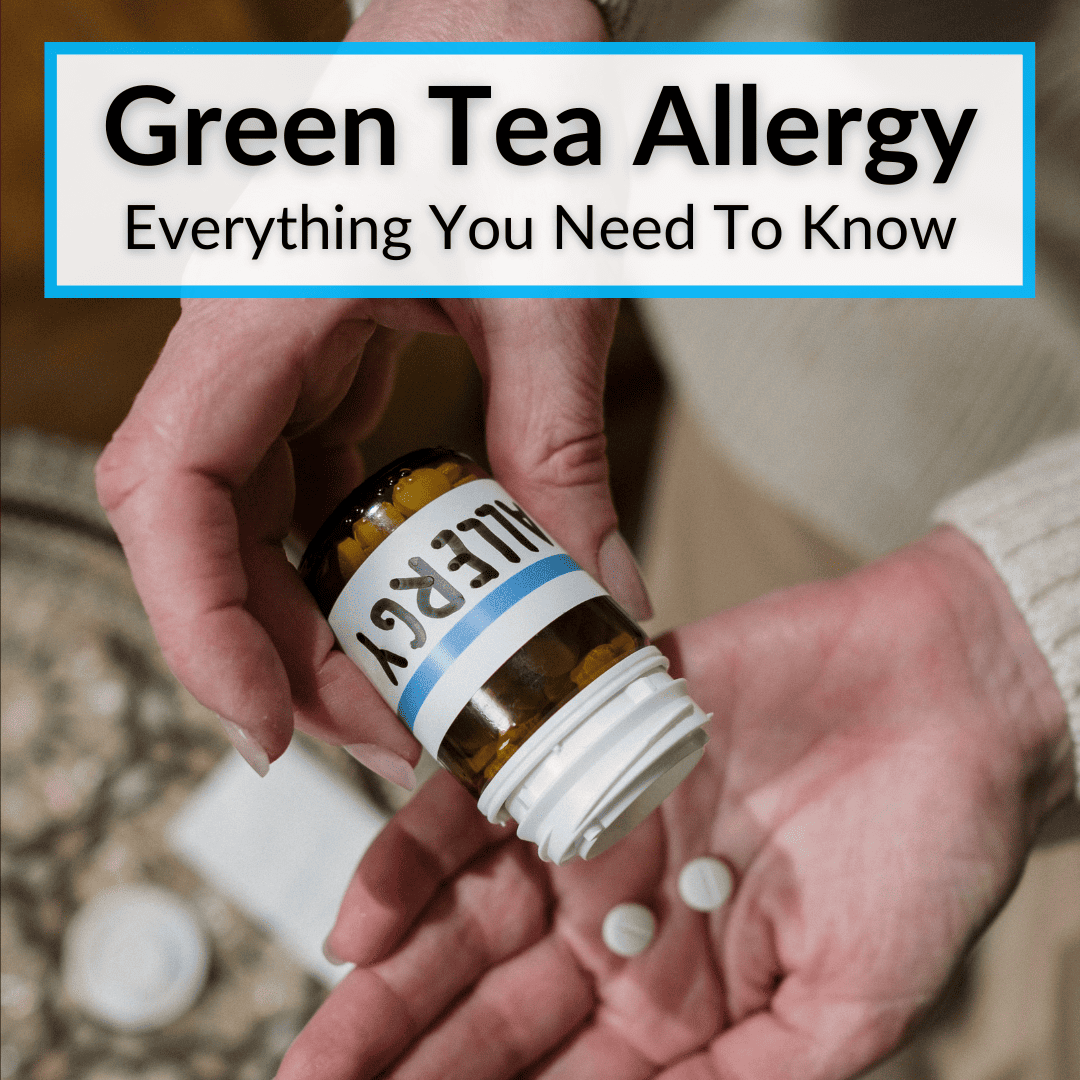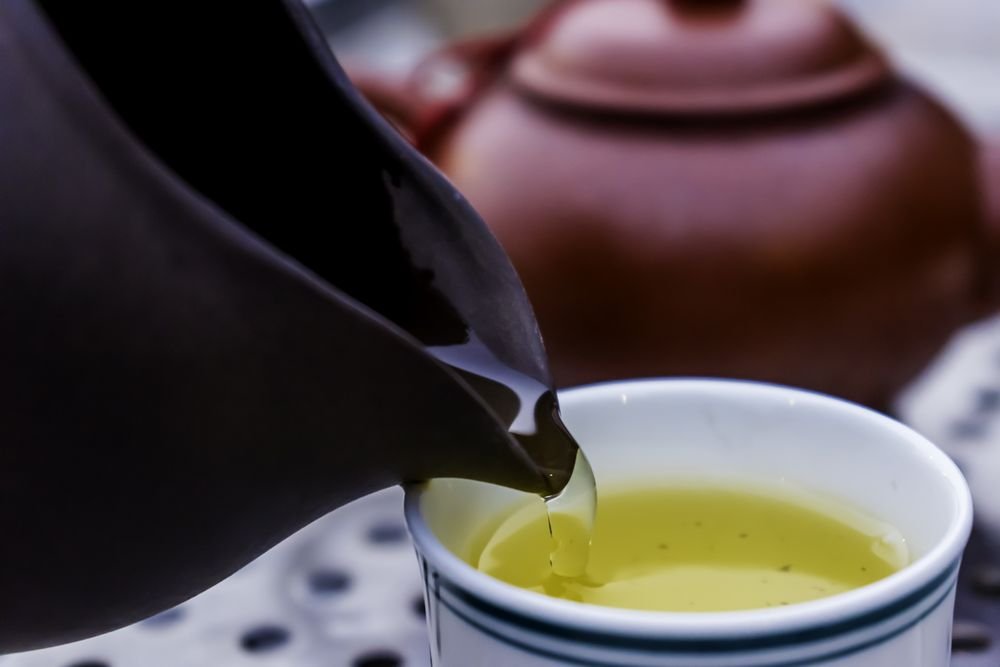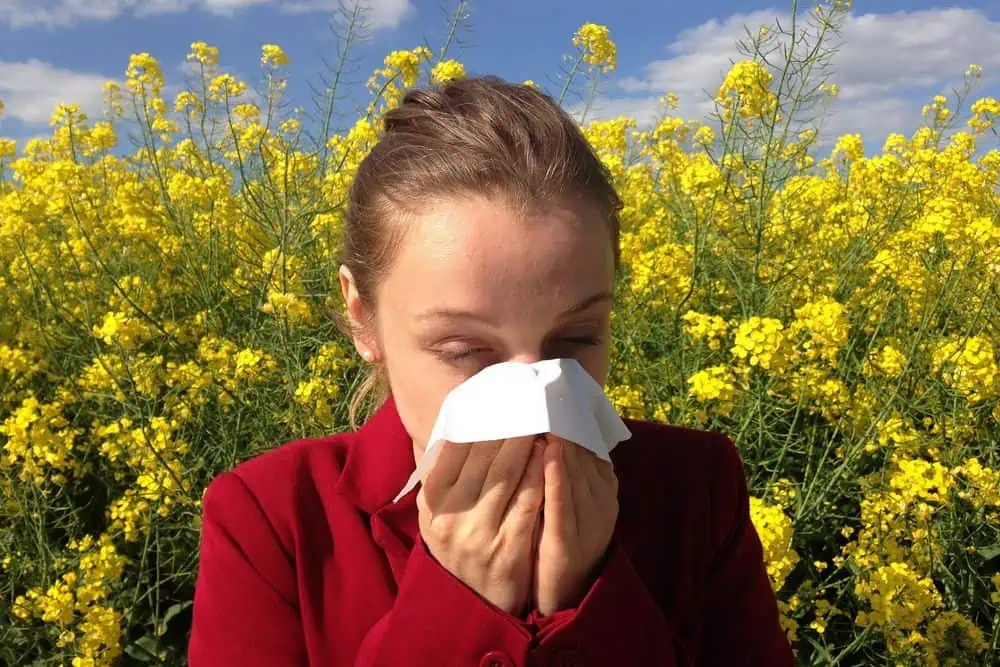 Do you think you may have a green tea allergy?
Do you think you may have a green tea allergy?
It is possible, but exceedingly rare.
And usually, it’s not even the tea itself that is at fault.
But if you get an allergic reaction shortly after drinking (or even touching) green tea, there is a chance you are allergic to it.
Or at least to certain components or additives.
Keep reading to learn all about green tea allergies, including how they present, what causes them, and more. We will answer any questions you may have.
Table of Contents
Can You Be Allergic To Green Tea?
Yes, some people are allergic to green tea. Immediately after drinking green tea, they develop symptoms like itchy skin or hives, swollen lips or face, and difficulty breathing.
However, many times they are not allergic to the tea itself, but to the components or additives in the tea. Thankfully, green tea allergies are very rare.
Green Tea Allergy Symptoms

Here are the symptoms of a green tea allergy. These symptoms usually occur within 15 minutes of drinking or touching green tea.
Skin Issues
Most people allergic to green tea experience itchy skin or hives immediately after consuming or touching green tea. They also develop skin bumps or blisters, redness, swelling, etc. Their lips and faces could also swell up.
Stomach Issues
In some cases, an allergy or sensitivity to green tea can result in gastric issues like nausea, diarrhea, heartburn, stomach cramps, and flatulence.
Shortness Of Breath
After drinking or touching the leaves of green tea, you may develop breathing issues. You might feel as if you are not getting enough air and may pant or gasp.
Swelling Of The Tongue Or Throat

One of the major signs of an allergy is a swollen tongue and throat. You might feel that your throat is closing and you are unable to swallow. This is similar to a choking sensation. You might also develop a cough as your body tries to clear your airways.
Anaphylaxis
In severe cases, some people become dizzy, lose consciousness, faint, or pass out. This is called anaphylaxis shock. This is a serious condition that can result in death. Please treat this as a medical emergency.
You must be aware of these signs so you can take all precautions to avoid touching or drinking green tea accidentally.
What Causes Green Tea Allergy?
A green tea allergy is very rare, but not entirely impossible. A person allergic to green tea may be allergic to the tea leaves or the additives and flavoring components in the tea. Some may be allergic to caffeine or L-theanine in the tea.
People allergic to green tea tend to develop the above allergy symptoms within a few minutes of drinking iced green tea or hot green tea. Some super-sensitive people cannot even touch green tea bags or leaves, because they immediately develop itchy skin, hives, or pruritis.
When you are allergic to green tea or its components, your body considers even a small sip of the beverage dangerous. As a result, your body produces antibodies that try to fight off the dangerous substance. Unfortunately, your body also reacts to the antibodies, resulting in symptoms like:
- Swollen face, lips, tongue, and throat
- Hives or pruritis
- Tingling or itchy sensation in the mouth
- Stomach issues
- Anaphylaxis shock
As stated before, anaphylactic shock is a medical emergency and you need to treat it as such.
Green Tea Histamine Intolerance

Histamine is a neurotransmitter and a hormone. Our body needs it for various physiological processes.
When you get a bug bite or eat or drink something you are allergic to, histamine acts as a messenger and tells your body that something is wrong. This triggers the immune system to react and block the harmful effects of the allergen.
In most cases, green tea helps control histamine levels in the body. Specifically, a compound in tea called epigallocatechin gallate (EGCG), is known to reduce histamine release.
So, in a way, green tea limits how much histamine your body makes. This is beneficial for people with allergies or sensitivities.
However, it’s important to know that more research is needed to fully understand how green tea affects histamine and its effects on the body.
Some people have been known to experience histamine release after tea consumption. This is why experts recommend avoiding green and black tea for people sensitive to histamine triggers.
Does Green Tea Cause Itchy Skin?
Green tea usually won’t cause itchy skin. However, some people who are sensitive or allergic to tea could experience skin itching, redness, pruritis, or hives.
Usually, it is additives and flavoring components in green tea that trigger allergies, not the tea itself. That said, some people are allergic to the L-theanine and caffeine in green tea.
If you’re experiencing itchy skin or gastric issues after consuming green tea, it might be a good idea to consult with a healthcare professional. They can help determine if you have an allergy or sensitivity to any specific components in the tea.
Is Green Tea Good For Allergies?

Research suggests that green tea could help fight allergy symptoms and provide relief to allergy sufferers (allergies to other things, not green tea). Compounds in green tea, such as epigallocatechin gallate (EGCG) and quercetin, have shown anti-allergic effects.
Who Should Not Drink Green Tea?
While green tea is healthy for most people, there are some who should avoid it and drink green tea alternatives instead. Here are some people who are better off not drinking green tea, or at least limiting consumption.
People With Anemia
People with anemia should limit their consumption of green tea. In large quantities, all forms of tannin-based teas, including green tea, tend to interfere with iron absorption. This can result in anemia over time.
The American Journal of Clinical Nutrition has reported that green tea extracts tend to reduce iron absorption by over 25%.
Osteoporosis Patients
Some preliminary studies show that 100 mg of caffeine removes 6 mg of calcium from the bones. Since a cup of green tea contains around 50 mg of caffeine, one cup of green tea could remove about 3 mg of calcium from the body.
This indicates that elderly people or people at risk of osteoporosis may want to limit their green tea consumption.
Pregnant And Breastfeeding Women

Green tea could interfere with folic acid absorption in pregnant women, which can result in fetal defects. Green tea also contains caffeine and the American College of Obstetricians and Gynecologists (ACOG) recommends that pregnant and nursing mothers limit their caffeine intake to less than 200 mg per day.
People Taking Certain Medicines
People taking medicines like ephedrine, anticoagulant/antiplatelet drugs, pentobarbital, Nadolol (Corgard), Atorvastatin (Lipitor), estrogen, adenosine, birth control pills, Cimetidine (Tagamet), clozapine, dipyridamole, and certain antibiotics should not drink green tea.
This is because green tea could interfere with the absorption of these medicines. We have an entire article on green tea medication interactions that has much more on this.
Allergic Reaction To Green Tea: Final Thoughts
Allergies to green tea are rare. And they are not usually to the tea itself, but to components or additives in the tea. If you do have a green tea allergy, it will usually present as a rash or hives that can be itchy. Shortness of breath may also result.
If you have serious symptoms after drinking green tea, see a doctor. If you suspect you have an allergy, even if the symptoms are not especially serious, you should still seek medical help. A doctor can tell you exactly what you are allergic to and guide you in what foods or drinks you should avoid.
Leave a Reply